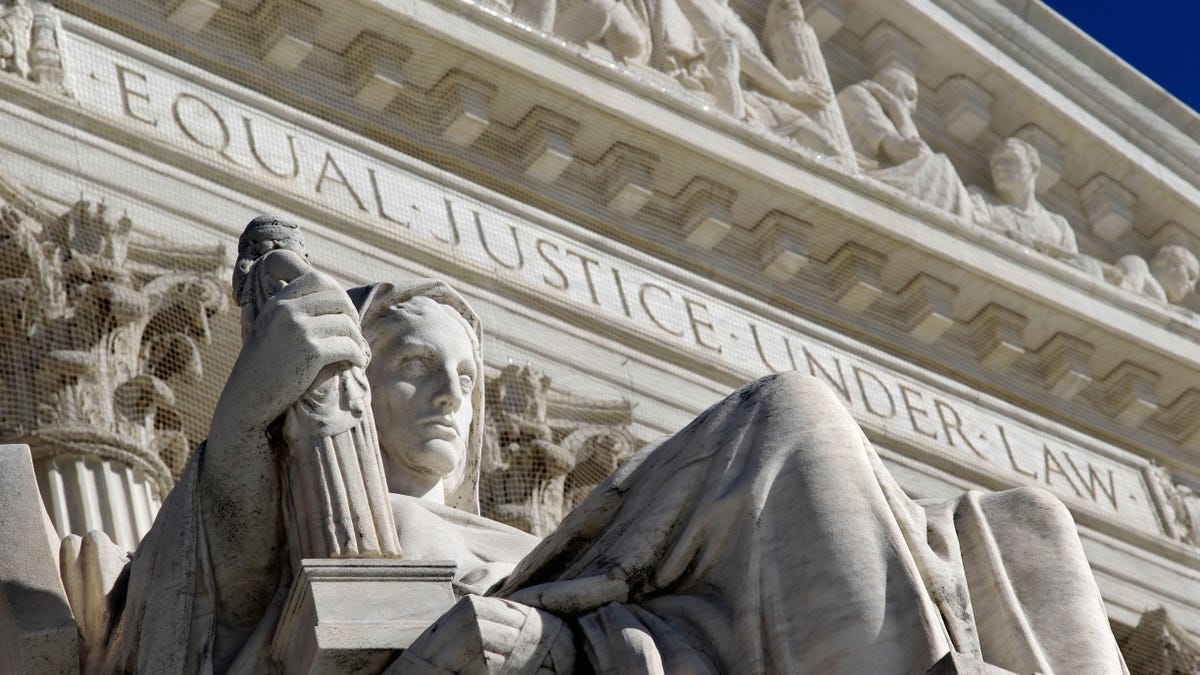
A detail of the West Facade of the U.S. Supreme Court is seen in Washington, Monday, March 7, 2011. (AP) (AP2011)
In the most significant global warming case to reach its front doors, a skeptical Supreme Court appears poised to block a major lawsuit brought by states and environmental groups against five large power companies for supposedly creating a public nuisance because of carbon dioxide emissions.
Tuesday's arguments revealed a high court bench that strongly questioned the ability of the states to bring the lawsuit and seemed to think that the federal government, through the Environmental Protection Agency, is the proper entity to regulate air pollution through the Clean Air Act.
"[T]he relief that you're seeking, asking a court to set standards for emissions, sounds like the kind of thing that EPA does. I mean, Congress set up the EPA to promulgate standards for emissions," Justice Ruth Bader Ginsburg told the lawyer representing the states and environmental groups. She went on to cast doubt on the propriety of a federal judge who lacks the resources and environmental expertise to regulate energy companies.
Picking up on that theme, Justice Samuel Alito asked "how does a district judge decide what is reasonable and cost-effective" when it comes to regulating alleged air polluters. And Chief Justice John Roberts addressed his concerns of how judges can determine costs and benefits. "I think that's a pretty big burden to impose on a district court judge," he said.
The states claim the power companies have caused irreparable environmental harm by allowing its plants to produce excessive levels of carbon dioxide. They claim people have died because of the pollution and others have been directly impacted by the resulting smog, decreased fresh water supplies, land erosion and rising sea levels.
A victory for the states and against the energy providers could lead to dramatic changes in the energy market and impact other industries, but none of the justices appeared keen to allow the lawsuit to move forward.
While the global warming controversy serves as the backdrop of the case, the legal merits of dispute turn on an analysis of the separation of powers and what branches are best designed to regulating industries.
The Obama administration joined the case and sided with the power companies arguing that the political branches should take the lead in regulating matters.
"In the 222 years that this Court has been sitting, it has never heard a case with so many potential perpetrators and so many potential victims," acting Solicitor General Neal Katyal said at the start of his case. “The very name of the alleged nuisance, "global warming," itself tells you much of what you need to know. There are billions of emitters of greenhouse gasses on the planet and billions of potential victims as well."
The government's decision to side with the power companies isn't popular with environmental groups.
"We're disappointed that the Obama administration would stand before the court and argue to limit access to the courts," John Kostyck, vice president, National Wildlife Federation, told Fox News after Tuesday's case. While he says the EPA has done good work the past two years in fighting global warming, Kostyck said the government has dragged its feet when it comes to cracking down on existing power plants.
"[T]his Court should not close the courthouse door to this case at the outset," New York Solicitor General Barbara Underwood argued on behalf of her state, five others, New York City and three environmental groups. "The common law action for public nuisance has been around for hundreds of years, has been adapted by courts to cover new environmental threats, and there's no reason why the courts can't do the same thing here."
Justice Antonin Scalia was troubled by how five companies were singled out in the lawsuit. Underwood explained that targeted power plants are responsible for 10 percent of U.S. emissions. But that didn't go over well with Scalia who said, "You’re lumping them all together. Suppose you lump together all the cows in the country. Would -- would that allow you to sue all those farmers? I mean, don't you have to do it defendant by defendant?"
Underwood duly noted that cows could not be sued collectively or individually and suggested that rules could be created that would only allow lawsuits against the largest polluters.
A decision is expected by the end of June. Justice Sonia Sotomayor did not participate because she heard arguments in the case as a judge on the Second Circuit U.S. Court of Appeals. The other two judges who heard that case agreed that the power companies could be sued.




